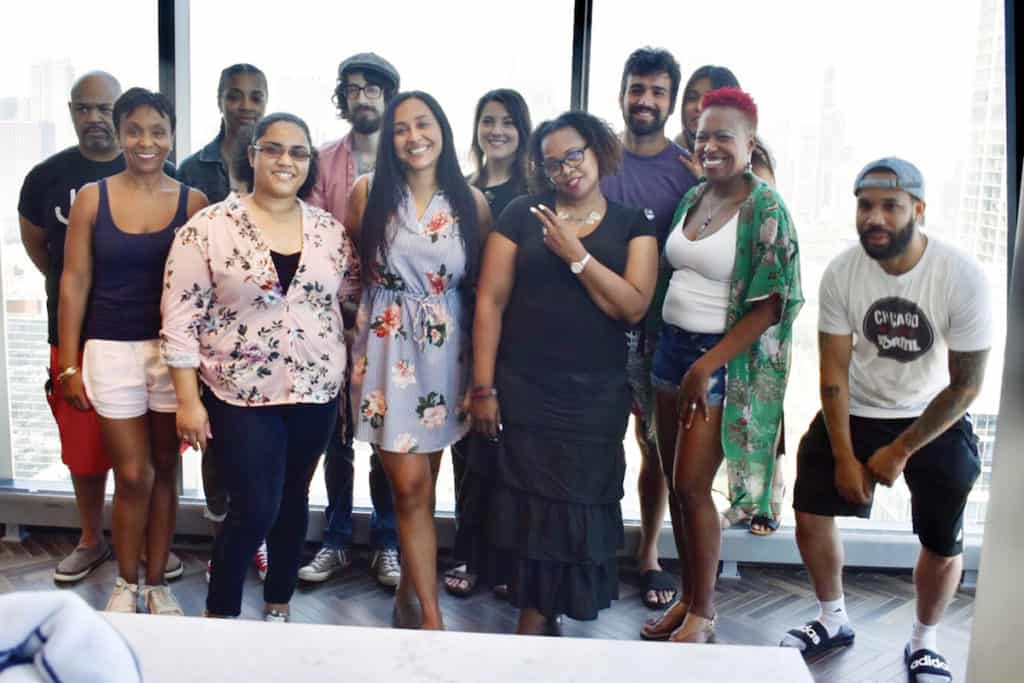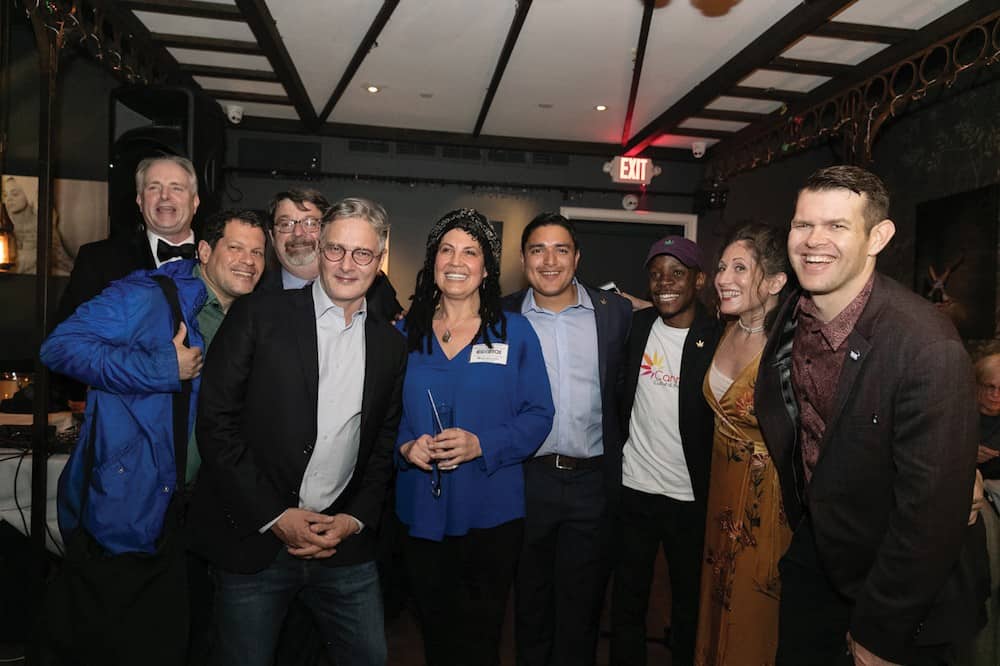There is no shortage of controversial topics in the cannabis industry, but the intertwined issues of social justice and social equity reside near the top of the list.
Politicians, activists, and industry operators from coast to coast generally agree social justice should be prioritized on local, state, and federal levels, yet there are few, if any, meaningful programs to help people of color (POC) gain a financial stake in the fast-growing, multibillion-dollar industry. No matter how well-meaning existing programs are, POC still represent a tiny fraction of stakeholders in the industry, and individuals who were targeted during the drug war still face many of the same challenges they did during prohibition.
To this day, African-Americans and Latinx represent almost half the convictions for drug law violations in the United States, despite representing only 32 percent of the population, according to the Drug Policy Alliance. Some of the top priorities for social justice and equity proponents include expunging cannabis arrest records, initiating small business incubators and education/mentoring programs, and offering no-interest loans and grants to people who were adversely impacted by the drug war.
California was the first state to raise the social equity flag, but local and state programs have been lackluster even there. Promising signs in the Midwest and on the East Coast indicate meaningful reforms could make 2020 a breakthrough year.
A slow grind out west
Nobody said reform would be easy. Myriad political, economic, and social factors make designing and implementing programs challenging for both legislators and industry operators. That’s not to say success stories don’t exist, but they are few and far between in an industry that enjoyed more than $10 billion in sales during 2018 and is projected to surpass $12 billion this year, according to New Frontier Data.
Proposition 64, which legalized recreational sales and use in California, sparked lively discussions about social equity, protections for small farmers and other operators, and creating a fair and balanced industry. But despite proponents’ good intentions, the reality has been disappointing. Large corporations and investors with deep pockets flocked to the state to dominate the industry from top to bottom. Much the same is happening elsewhere.
Chaney Turner co-founded The People’s Dispensary (TPD) in San Francisco in 2017 with a mission to promote social equity and cater to marginalized communities including POC, queer, disabled, the formerly incarcerated, and economically disadvantaged people. When she looks at the competition now, in the Bay Area and beyond, she sees few other companies on the same track. The state needs to do more to promote social justice policies, she believes.
“They have not done that well, and they are not taking the lead in making [the social justice situation] better,” she said. “Equity isn’t that hard, and being socially responsible isn’t that hard. When elected officials and people in policy bring up equity, they want to make it a big math equation, but it’s not. Just give the people what they need.”
She explained California has not allocated enough funding to support equity programs. Paperwork from prospective POC businesses is piling up in San Francisco and Oakland. “These cities want to throw out the word ‘equity,’ but there isn’t any action behind it. I feel like the onus is put on small businesses of color to get things done. But we need some type of support from the state. If you look at all these cities, it’s POC with no capital.”
Turner and her POC and queer business partners who started TPD have developed a co-op-style business model, allowing investors from the community to have an ownership stake in the dispensary. Turner and her co-founders have offered to help people in other states open like-minded dispensaries and are actively pursuing projects across the country.
“We are invited to certain places and we partner with communities there, and we want to make sure we partner with people that are values-aligned with our mission,” she said. “Part of that is having non-accredited investment, reinvestment into employees and local communities. Whatever cities we operate in, those people do the civic engagement and hiring. Make sure the empowerment is into the community we serve, [because] the priorities are different in every city. TPD is about partnership when we go to outside communities.”
Plotting a new course
In the Midwest and on the East Coast, legislators and industry operators are watching social equity developments on the West Coast, duly noting the pitfalls and challenges. They’re optimistic they can do better.
Legislative initiatives in Illinois and Massachusetts are attempting to reach individuals who have been economically disadvantaged, disproportionately impacted by the war on drugs, or both. However, Massachusetts’s program has been slow to develop, and to date only 1 percent to 2 percent of cannabis businesses are owned by minorities. Illinois was the first state to legalize the sale and use of recreational marijuana through legislation, and activists have praised the law for its social equity components, which include reduced application fees and grants and loans. Some financing comes from existing cannabis companies. Of course, now the state must determine how the loan and grant program will work. The application process opens in October.

“There is a political will in Illinois,” said Kiana Hughes, educational director for the Chicago chapter of the National Organization for the Reform of Marijuana Laws (NORML). “We will be the flagship [equity program] in the Midwest, and the provision that passed is more comprehensive than anything out there across the U.S. It can happen and will happen here, but there is some confusion about how exactly it’s supposed to work.”
In Massachusetts, the state senate recently rejected Democratic Senator Sonia Chang-Díaz’s proposal to make zero-interest cannabis-related business loans available to benefit small businesses, diverse owners, and disenfranchised communities. A proposed budget of $1 million was meant to be self-sustaining through a portion of projected tax revenue and other sources.
In New York, lawmakers recently agreed to decriminalize cannabis by decreasing penalties and allowing expungement of previous arrests for small amounts of cannabis. The state legislature was unable to muster enough votes for a legalization bill, in part because the bill lacked enough social equity provisions.

“It looks like New York is on the social justice and decriminalization path but they are at a standstill, and I think it’s smart to hold off,” said Shanita Penny, president of the Minority Cannabis Business Association’s (MCBA) board of directors and a member of the New Jersey Cannabis Industry Association’s board of trustees. “I’m happy to see them being thoughtful. New Jersey has a deadline for four more vertically integrated licenses. That will require significant capital, and those opportunities are geared toward larger operations. But there are pending licenses that will be available without the requirement around vertical integration, and that will open the door for smaller operators.”
Nelson Guerrero is co-founder and executive director for the Cannabis Cultural Association, a New York-based nonprofit group that helps marginalized and underrepresented communities participate in the legal cannabis industry. “We’ve seen all these mistakes on the West Coast,” he said. “When I was in Governor [Andrew] Cuomo’s office, I reiterated we don’t want be a copy of the West Coast. That’s the opposite of what we need here. These programs have always been underfunded, and sometimes the equity applicants get sharked at the last minute—people getting offered $50,000 to $100,000 to be on the application as an equity applicant” even though they will have no role in the business.

Guerrero explained Latinx and African American communities have been disproportionately criminalized for marijuana possession, making individuals in those communities hesitant to use cannabis for medicine or participate in the industry at any level out of fear they may be prosecuted. Nonetheless, he believes the equity legislation proposed in New York and New Jersey will be impactful and said promising models that give equity applicants a legitimate ownership stake in the industry are being developed in other states.
“I’ve seen franchising models come up where there is a multi-state operator (MSO) and an equity applicant, and those seem to be working,” he said. “It’s not the most ideal model, because they are giving a large chunk of ownership to a private corporation. But if that gets you going to create a viable business, and there’s a way to have a buyout option, that’s one of the better solutions going forward. Hopefully, on the East Coast it will be enacted better. The last thing we want is a bunch of MSOs like MedMen with 100 locations.”
Putting corporations on the spot
Effecting real change by integrating social justice into the foundation of the industry will require MSOs and other large corporations to support meaningful programs that give drug war victims and POCs the education, training, and other tools to help them find long-term employment and a genuine financial stake in the industry.
Chicago-based Cresco Labs is one of the few major MSOs to initiate a comprehensive program. The company’s Social Equity & Educational Development (SEED) initiative, launched in May 2019, is designed to promote “inclusion, equality, and community engagement” and centers on three main components: social equity, a community impact incubator program, and workforce development/education.
Barrington Rutherford, senior vice president of community integration at Cresco, grew up on Chicago’s rough-and-tumble south side and knows all too well the drug war’s impact on urban communities. He explained social justice and equity are part of Cresco’s foundation. The company worked with Governor J.B. Pritzker, a Democrat, to design SEED and advocated the legislature mandate cannabis companies offer social justice programs.
“Our CEO [Charles Bachtell] told the governor that if you want to see diversity and equity, then force the industry to do it,” Rutherford said. “It’s a privilege to be in this business, and we should treat it that way. We were part of crafting what the minimum standard should be, and we will exceed that, but we are also thrilled to be able to help out and become an on-ramp for people who want to enter this industry.”
Cresco is mentoring eight equity groups, providing education and applied experience members will need to work in the industry or start their own businesses. The company plans to roll out similar programs in every state where it operates and scale up as they go. Cresco also hosts expungement events and partners with community organizations across the U.S., and it has secured large law firms’ commitment to help people through the process.
“The [Illinois] governor and the legislature did a phenomenal job of setting a standard saying everyone should be responsible for fixing this problem, and I think Illinois will be the model for the rest of the U.S.,” Rutherford said. “Everybody is responsible for making sure this nascent industry gets off on the right foot and people who were harmed by the drug war can participate in the industry in whatever way they can.”
NORML’s Hughes is cautiously optimistic about the social equity programs and incentives in place in Illinois, but she also is aware how starting any small business can be difficult in a highly regulated industry like cannabis.
“Think about living in an area where there are businesses owned and operated by black people. It’s so layered and multi-faceted,” she said. “A dispensary is a retail business, so there is some general understanding of entrepreneurial business stuff that is lacking. And then the people who do have the capital and business mindset, there is fear or trepidation about being in the cannabis industry or even being associated with it.”

Legislating social justice
Important reforms also are under discussion at the federal level. In February, Senator Cory Booker (D-N.J.) introduced the Marijuana Justice Act, which would remove cannabis from the federal list of controlled substances and expunge past convictions. Senators Bernie Sanders (I-Vt.), Elizabeth Warren (D-Mass.), Kamala Harris (D-Calif.), and Kirsten Gillibrand (D-N.Y.) co-sponsor the bill.
The list of prominent Democrats who support some form of comprehensive cannabis reform grows by the day and includes presidential hopefuls Beto O’Rourke (former U.S. Representative, D-Texas) and Senator Amy Klobuchar (D-Minn.). Whether federal legalization becomes a major campaign issue in 2020 remains to be seen, but advocates expect progress on issues including banking, expungement, and other aspects of the social justice equation. Three pending comprehensive reform bills call for removing cannabis from the Controlled Substances Act: the Marijuana Justice Act; the Ending Federal Prohibition Act, sponsored by Representatives Tulsi Gabbard (D-Hawaii) and Don Young (R-Alaska); and, the Marijuana Freedom and Opportunity Act, sponsored by Senator Chuck Schumer (D-N.Y.).
On the federal level, MCBA’s Penny said the SAFE Banking Act may be the policy initiative that could have the biggest impact for people of color, because it would create new opportunities for small business owners who need loans, access to traditional banking services, and tax write-offs that every other business in the U.S. enjoys. Since most banks do not work with cannabis companies, operators often must come up with the capital to start a business themselves, which is another major challenge for POC looking to start a cannabis enterprise.
“SAFE Banking is definitely something that is going to tip the scales, and it is critically needed wherever you are in the industry,” she said. “The large MSOs are losing millions because of [inability to write off] business expenses and are having trouble operating at scale. So, the industry needs it, minority business owners need it, social equity participants need it, and I am very excited about it passing this year. It would be a big step in the right direction, and it has bipartisan support to give relief to states that are implementing programs.”
In July, a formidable group of civil rights and cannabis advocates formed a coalition in order to lobby for more social justice considerations as legislators begin debating legalization bills in the House and Senate. The coalition includes the Drug Policy Alliance, Human Rights Watch, NORML, American Civil Liberties Union, Center for American Progress, and Students for Sensible Drug Policy.
The coalition’s top agenda items include removing cannabis from the Controlled Substances Act, justice reform measures like expungement and resentencing, eliminating public-benefit penalties related to cannabis use, directing tax revenues to local governments to reinvest in communities most impacted by the war on drugs, and eliminating cannabis testing and arrests as factors for child welfare and immigration cases.
“Black and brown people have been traumatized by our racist marijuana laws and, as the federal government embraces reform, our groups will make sure any proposal will repair the damage done to those communities,” said Queen Adesuyi, policy coordinator at the Drug Policy Alliance.
Making their voices heard
While politicians and industry leaders talk a big game about social justice and equity, very few laws compel companies to make programs an integral part of the industry. The tide seems to be turning, though, as more attention and debate develops in states where legalization is on the horizon and legislators want to create equity from the beginning.
“New York almost had adult use in the budget but there was no social equity in the bill, so the legislature wasn’t for it,” said Guerrero. “Whatever eventually passes will be similar to what Illinois passed. We can’t avoid the social equity question, or there won’t be an industry here. We have yet to see one that is perfect, so it’s a work in progress.”
Regardless the slow progress thus far, activists fear criticizing current efforts will discourage people of color from continuing critical work that remains to be done.
“It’s really frustrating to see how equity is discussed in the media,” said Hughes. “The headlines are always salacious and emphasize that black people don’t think enough is being done to address the problems, and it becomes a negative narrative. But it’s off to a great start in Illinois, and way more than we’re seeing across the U.S.”
Penny agrees progress is being made, slowly but surely, and remains optimistic about the future for people of color at all levels. In some respects, the answer to further progress is the same as it always has been: activism and advocacy on the front lines, both locally and nationally. “You should see the lines to get into congressional hearings,” she said. “People are lined up so they can get a seat for those hearings and are becoming more educated and understanding their impact.”











[…] seasoned expertise of a veteran green thumb now cultivating for the masses or a brand built around uplifting specific social justice causes, there’s immense value in knowing what makes your company unique and showcasing that uniqueness […]